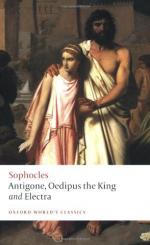|
This section contains 267 words (approx. 1 page at 400 words per page) |

|
Electra Summary & Study Guide Description
Electra Summary & Study Guide includes comprehensive information and analysis to help you understand the book. This study guide contains the following sections:
This detailed literature summary also contains Bibliography on Electra by Sophocles.
Sophocles's Electra, written around 409 B.C., is based on the legend of the House of Atreus, a story which contemporary Greek audiences would have known from childhood. The major themes of this story concern retribution for crimes committed within the family of Atreus, who was Electra's grandfather. Electra's duty in the play is to avenge her father's murder, but this involves killing her own mother, another crime which will have consequences down the line.
Sophocles's tragedy deals with the fate of mortals such as Electra and her brother Orestes, who act out lives which seem on the one hand to be determined by the gods, yet on the other hand are shaped by decisions made by seemingly autonomous individuals. One reason why Sophocles's plays were so successful was that he was able to articulate this complex and problematic relationship between humans and gods in a probing yet eloquent manner. His audiences responded to Electra's filial duty to avenge her father's death, for this was an honorable deed, and they were affected by the tragic consequences which it involved.
The powerful characters in Electra express many emotions with which Athenian audiences identified. Many of these themes still prove captivating centuries later, for they are universal human feelings of love and hate, suffering and triumph. Critics have noted that in other versions of the same story, such as Aeschylus's Oresteia trilogy, events are presented as the result of destiny, whereas Sophocles brings the action down to the human sphere and causes his audience to wonder at the level of responsibility which man has for his own actions.
Read more from the Study Guide
|
This section contains 267 words (approx. 1 page at 400 words per page) |

|



